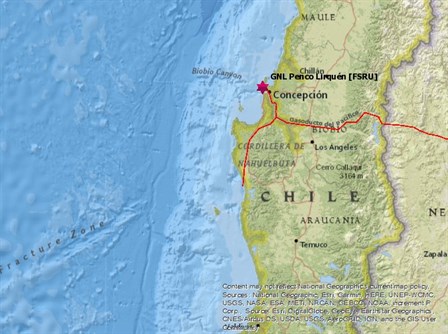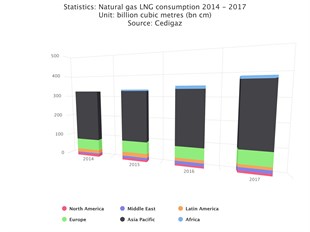Hoegh backs out of Chile LNG project but buoyant on market
LONDON, (Reuters) - Hoegh LNG said it had let agreements lapse in Chile that tied one of its floating liquefied natural gas (LNG) import vessels to a project there because approvals for the initiative were likely to be delayed again.

Map Source: EWA
But the company, one of the few to specialize in floating storage and regasification units (FSRUs), said LNG prices and shipping rates will continue to be strong, raising the prospects of more dealmaking for global LNG import and export projects.
The Norwegian company was due to provide a floating storage and regasification unit (FSRU) to GNL Penco under a 2015 deal, with an original start date of the second quarter of 2018, but regulatory permits were slow in coming.
Hoegh said it had been “made aware that the planned approval process for the GNL Penco FSRU project is likely to be further delayed, and therefore the parties have agreed to let the contract expire”.
Hoegh’s newbuild FSRU called Esperanza was intended for the Chile project, but with the delays in mind the company agreed a three-year charter deal with China National Offshore Oil Corporation (CNOOC) after taking delivery earlier this year.
Hoegh, privately-owned Excelerate and U.S.-listed Golar LNG dominate the FSRU business, which has existed for barely a decade with the discovery of how to fit the complex and heavy infrastructure of an onshore terminal onto a vessel.
There were 29 FSRUs operating around the world by the second quarter of 2018, compared to 25 a year before, Hoegh said. Of 12 vessels on order around the world, six were looking to be employed by projects, which Chief Executive Sveinung Stohle described as “very manageable”.
Global LNG demand, particularly from China, has surprised on the upside in the past year, creating opportunities to strike financing and commercial deals for new or stalled projects after a protracted period of low LNG prices.

Source: EWA
LNG carrier rates soared through the year as high as $90,000 a day, Stohle said, compared to rates as low as $25,000 a day last year. Asian spot LNG prices LNG-AS have almost doubled to over $11 per million British thermal units (mmBtu).
This may help Hoegh, irrespective of whether FSRU rates also rally, because it would keep LNG carrier companies focused on their core business rather than branching out into the FSRU segment, Stohle told investors.
“The rates for the carrier market will stay and, even increase from where they are, certainly for the next two to three years,” he said. “Competition coming from that side will focus on the shipping, not the FSRU side.”
“We are not many in this market; the question is how many will remain.”
Hoegh has 10 FSRUs that are employed under long-term contracts or chartered, with two newbuilds due to be delivered. Stohle told investors a deal to provide an FSRU in Australia, announced on Monday, effectively leaves just one unemployed FSRU as of now.
A newbuild due in November known as “FSRU 9” already has a 15-month charter while the vessel is marketed to long-term projects, and “FSRU 10” is due next May.
Stohle indicated Hoegh was not considering taking FSRU Gallant out of Egypt early, despite questions raised about demand for LNG in the country with plans to boost gas output.

- RWE strengthens partnerships with ADNOC and Masdar to enhance energy security in Germany and Europe
- TotalEnergies and Mozambique announce the full restart of the $20-B Mozambique LNG project
- Five energy market trends to track in 2026, the year of the glut
- Venture Global wins LNG arbitration case brought by Spain's Repsol
- Trinity Gas Storage reaches FID on Phase II expansion



Comments